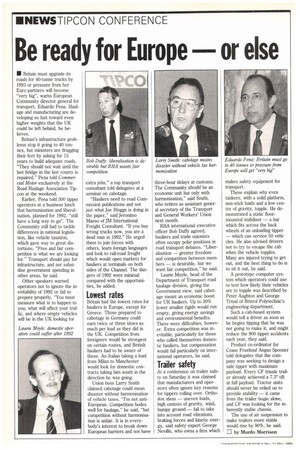Be ready for Europe or else
Page 22

If you've noticed an error in this article please click here to report it so we can fix it.
• Britain must upgrade its roads for 40-tonne trucks by 1993 or pressure from her Euro partners will become "very big", warns European Community director general for transport, Eduardo Pena. Haulage and manufacturing are developing so fast toward even higher weights that the UK could be left behind, he believes.
Britain's infrastructure problems stop it going to 40 tonnes, but ministers are dragging their feet by asking for 15 years to build adequate roads. "They should not wait until the last bridge in the last county is repaired," Pena told Commercial Motor exclusively at the Road Haulage Association Tipcon at the weekend.
Earlier, Pena told 300 tipper operators at a business lunch that harmonisation and liberalisation, planned for 1992, "still have a long way to go". The Community still had to tackle differences in national legislation, like vehicle taxation, which gave way to great distortions. "Free and fair competition is what we are looking for." Transport should pay for infrastructure, and not subsidise government spending in other areas, he said.
Other speakers warned operators not to ignore the inevitability of 1992 or fail to prepare properly. "You must measure what is to happen to you; what will affect your traffic, and where empty vehicles will be in the UK looking for extra jobs," a top transport consultant told delegates at a seminar on cabotage.
"Hauliers need to read Commission publications and not just what Joe Bloggs is doing in the paper," said Jeronimo Maeso of JM International Freight Consultant. "If you buy wrong trucks now, you are a dead man in 1992." He urged them to join forces with others, learn foreign languages and look to rail-road freight which would open markets for hauliers at terminals on both sides of the Channel. The dangers of 1992 were minimal compared with the opportunities, he added.
Lowest rates
Britain had the lowest rates for hauliers in Europe, except for Greece. Those prepared to cabotage in Germany could earn twice or three times as much per load as they did in the UK. Competition from foreigners would be strongest on certain routes, and British hauliers had to be aware of these. An Italian taking a load from Milan to Manchester would look for domestic contracts taking him south in the direction he was going.
Union boss Larry Smith claimed cabotage could mean disaster without harmonisation of vehicle taxes. "I'm not antiEuropean. Competition bodes well for haulage," he said, "but competition without harmonisation is unfair. It is in everybody's interest to break down European barriers and not have three-hour delays at customs. The Community should be an economic unit but only with harmonisation," said Smith, who retires as assistant general secretary of the Transport and General Workers' Union next month.
RHA international executive officer Bob Duffy agreed, hauliers and trade unionists often occupy polar positions in road transport debates. "Liberalisation — greater freedom and competition between members — is desirable, but we want fair competition," he said.
Laurie Moyle, head of the Department of Transport road haulage division, giving the Government view, said cabotage meant an economic boost for UK hauliers. Up to 30% fewer smaller rigids would run empty, giving energy savings and environmental benefits. There were difficulties, however. Extra competition was inevitable, particularly for those who called themselves domestic hauliers, but compensation would fail particularly on international operators, he said.
Trailer safety
At a conference on trailer safety on Saturday it was claimed that manufacturers and operators often ignore key reasons for tippers rolling over. Orthodox ideas — uneven loads, high centres of gravity, wind, bumpy ground — fail to take into account road vibrations, braking forces and kinetic energy, said safety expert George Neville, who owns a firm which makes safety equipment for transport.
These explain why even tankers, with a solid platform, non-stick loads and a low centre of gravity, topple. He demonstrated a static floormounted stabiliser — a bar which fits across the back wheels of an unloading tipper — which can service 50 vehicles. He also advised drivers not to try to escape the cab when the vehicle topples. Many are injured trying to get out, and the best thing to do is to sit it out, he said.
. A prototype computer system which operators could use to test how likely their vehicles are to topple was described by Peter Aughton and George Tnnal of Bristol Polytechnic's engineering department.
Such a cab-based system would tell a driver as soon as he begins tipping that he was not going to make it, and might reduce the 900 tipper accidents each year, they said.
Product co-ordinator for Crane Fruehauf Angus Spooner told delegates that the company was seeking to design a safe tipper with maximum payload. Every CF triaxle trailer already achieved a 7.5° tilt at full payload. Tractor units should never be relied on to provide stability — it came from the trailer bogie alone, and CF was looking for the inherently stable chassis.
The use of air suspension to make trailers more stable would rise by 90%, he said.
0 by Murdo Morrison




































































































